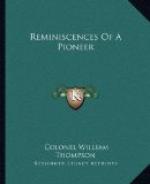Jim Clark now called a halt. To follow further would result in some of us getting killed, as the Snakes would then have the advantage. Reloading our rifles we returned to count the result of our victory. We found four dead Indians, including one that had had his leg broken by a rifle ball and had been dispatched by our allies, who now proceeded to scalp the dead according to the usages and traditions of their race. It was a gory spectacle, and when they generously offered to divide the bloody trophies, we politely declined, saying the scalps belonged to them, as they had lost their great chief by the treachery of the dead Indians. The operation of lifting the scalp was a simple one. A knife was run around the head just above the ears and the skin peeled off. That was the first I ever saw, and I had no desire to see the operation repeated. Some of those that escaped must have been wounded, but we had no means of knowing the number of these.
The expedition had been partially successful, but keen regret was felt, not alone by our party, but by our allies, that old Polina had escaped. He was the scourge of the whites in all southeastern Oregon, and while he lived there could be no such thing as peace. He was reserved, however, for the rifle of Howard Maupin, father of the youth who was with us and was kneeling by my side when I fired at the fleeing savages. But that will be reserved for a future chapter. Besides killing four Indians we had captured a number of ponies and some of the stolen stock belonging to the whites. The ponies we gave to our friends, the Warm Springs, besides a captured gun. After destroying everything of value that we could not carry with us, including some camp effects, we returned to our horses and started back. We parted with our friends at their camp of the night before, who lost no time after their arrival there in packing up and, taking their dead chief with them, making haste to reach the reservation as soon as possible.
After bidding them adieu, we traveled on our return until daylight when we stopped, unsaddled our horses and picketed them to graze and rest for a couple of hours. Saddling up again we pushed on to Bridge Creek, where we arrived towards evening. We had been in the saddle now, with slight intermissions, for more than forty-eight hours, and rest and sleep were a most welcome boon. Our horses, too, were nearly spent, and here we remained to rest and recruit.




